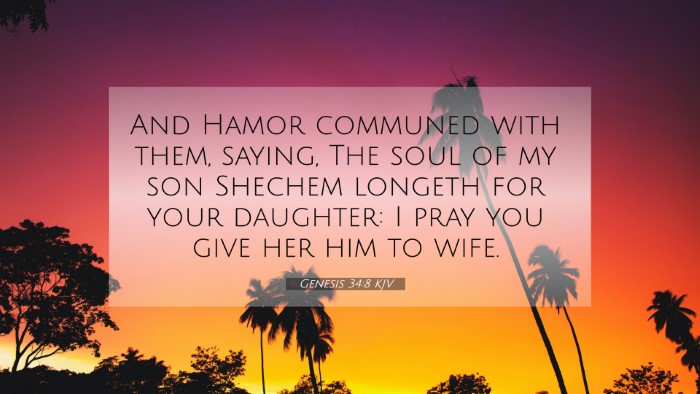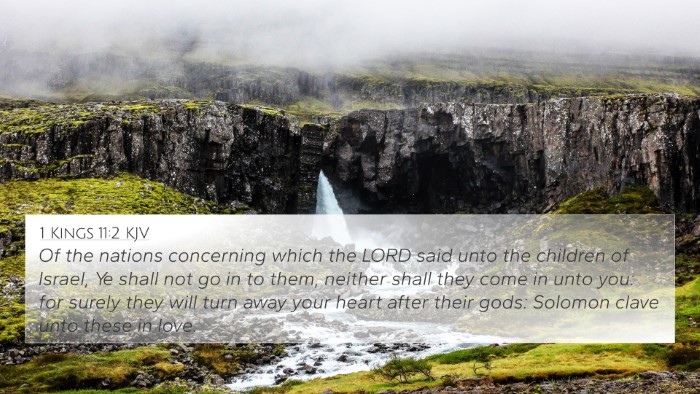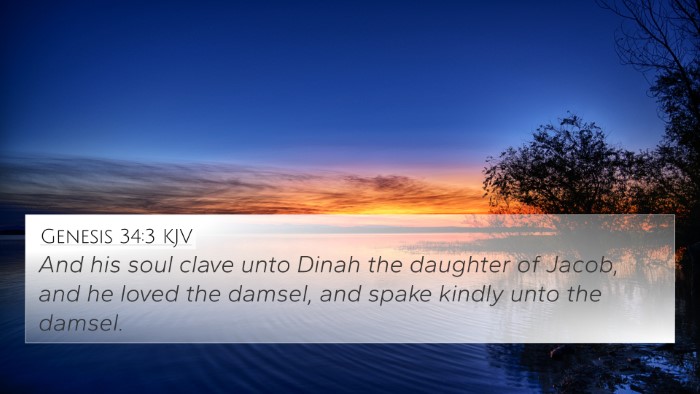Understanding Genesis 34:8
This verse tells the story of Shechem's desire for Dinah and sets the stage for a dramatic narrative involving family, honor, and retribution. Genesis 34:8 states:
“But Hamor spoke with them, saying, ‘The soul of my son Shechem longs for your daughter. Please give her to him as a wife.’”
Context and Background
This chapter occurs in the larger narrative of Jacob’s family and the tensions that arise due to intermarriage with the Canaanites. Shechem, the son of Hamor, the Hivite, expresses a strong desire for Dinah, Jacob’s daughter, highlighting desires that cross cultural boundaries. Biblical scholars often examine the implications of such desires within the context of familial integrity and social customs.
Interpretative Insights
- Hamor’s Proposal: Hamor's approach highlights the Canaanite customs regarding marriage and family alliances. This request is not merely personal but inter-tribal, manifesting the interactions and tensions between different cultures and peoples.
- Thematic Significance: The longing of Shechem for Dinah can be seen as a symbol of desire that transcends mere physical attraction, leading to potential conflict due to differing moral and ethical standards.
Commentary Insights
From a combined analysis of public domain commentaries:
- Matthew Henry: Henry emphasizes the dishonor associated with Shechem's act, having taken Dinah without her family's consent, reflecting the severity of sin and the consequences of desires unchecked by moral boundaries.
- Albert Barnes: Barnes provides socio-political context, suggesting that Hamor’s overtures represent a calculated effort to establish a safer relationship with Jacob’s family, indicative of the diplomacy often seen in tribal interactions of the time.
- Adam Clarke: Clarke notes the cultural implications of Shechem’s actions, pointing out that they reflect a degrading view of women prevalent in ancient societies, while also implying Dinah's passive role in this narrative.
Connections to Other Biblical Texts
Genesis 34:8 provides essential thematic connections to several other Bible verses:
- Exodus 34:16: Discusses the dangers of intermarrying with other peoples and the potential spiritual consequences.
- Deuteronomy 7:3-4: Advises against marrying outsiders to prevent leading the Israelites away from God.
- 1 Corinthians 15:33: Reminds of the negative influence of corrupt company, underscoring the importance of maintaining one's values.
- 2 Corinthians 6:14: Advises believers not to be unequally yoked with non-believers, tying into the themes of faith and marriage.
- Genesis 34:1: The earlier verse sets the stage by introducing Dinah and hinting at the troubles that arise from her encounter with Shechem.
- Genesis 38:1-2: Reflects on the theme of familial loyalty and the consequences of passions outside of God's directive.
- Ruth 1:1: Talks about inter-tribal relationships and the complexities that arise due to cultural differences.
Conclusion
This verse serves as a crucial point around which the themes of desire, honor, and conflict revolve. The intricate dynamics showcased in Genesis 34:8 invite deeper theological exploration and cross-referencing throughout the scripture, emphasizing the interconnectedness of narratives within the Biblical text.
For those studying the Bible, it is crucial to use tools for Bible cross-referencing to grasp the broader implications of such verses. By engaging in comparative Bible verse analysis and leveraging a Bible cross-reference guide, readers can unlock rich insights across differing texts.
Further Study Recommendations
- Exploring Biblical covenants: Understanding how cultural practices affect relationships within the framework of God's covenant.
- Inter-Biblical dialogue: Considering how narratives in Genesis echo through prophetic literature and into the teachings of Christ.
- Thematic study of marriage in the Bible: Investigate how relationships are addressed across both Testaments.
- Cross-referencing with New Testament teachings: Examine how issues of desire and purity are tackled by the Apostles.







